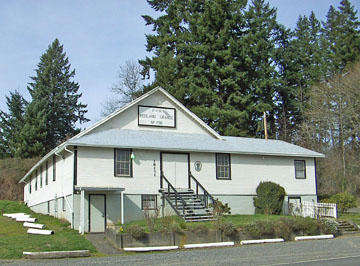Redland Grange
The Redland Grange was established in 1931 when Molten and Edith Sprague donated their property to the community of Redland to be used as a community space. 88 years later, we are still here today serving the community of Redland.
On December 14, 2019 Redland Grange honored Molten and Edith’s contribution with a plaque that is now displayed in the Grange hall. We will forever be appreciative of their generosity.
Membership
Membership to the Redland grange gives you the opportunity to become join us! Dues are $50.00 a year and are prorated during the month you join. The Initiation fee for new members is $5.00. To join, an application (along with the dues and fees) must be submitted to the Secretary of the Grange.
For more information, contact: Courtney Rae (760) 445-8346 or any other members listed on our contact page.
You can also choose to come to a meeting instead!
History of Our National Grange Organization
The Grange came into being in 1867 because of the vision of Oliver Hudson Kelley, a Minnesota farmer and activist. He had long held that farmers, because of their independent and scattered nature, needed a national organization which would represent them much as unions were beginning to do for industrial workers. Farmers were at the mercy of merchants for both needed farm supplies and for marketing their crops. Railroads and warehouse companies were taking advantage of farmers as well.
Kelley and some of his friends organized the National Grange (officially known as the Order of Patrons of Husbandry) as a fraternal group similar to the Masonic lodge. The early leaders were responsible for promoting cooperatives which had the potential of helping farmers economically. Effective lobbying efforts were undertaken early and this activity remains a bulwark of Grange service to rural America. Education of rural residents was championed by the early Grange and, due to Grange agitation, dramatic improvements were made in rural schools. The birth of the Extension Service, Rural Free Delivery, and the Farm Credit System were largely due to Grange lobbying. The Grange at all levels is strictly nonpartisan and does not endorse candidates for public office nor contribute to their campaigns.
At the national level, the Grange actively lobbies for causes which are in accord with organizational policy. All policy within the Grange originates at the local level and the organization remains as one of America’s best examples of democratic grass-roots activism. The primary legislative objective of the Grange is to represent the views of rural residents and the agricultural community. These issues include transportation, farm programs, rural economic development, education, health and safety concerns and many others. Each year the policies are summarized and published in booklet form.
Early in its history Grange leaders realized that social interaction was especially important to rural residents. For over 140 years Grange halls have existed as community centers where residents gather for educational events, dances, potlucks, town meetings, nonpartisan political rallies and other meetings. Junior Grange, 4-H, FFA, scouting and Camp Fire groups have thrived because of Grange support and each year tens of thousands of Grange members participate in numerous community service projects.
A wide variety of social, leadership and educational opportunities for members of all ages have been made available throughout the organization’ s long history. Members not only receive personal satisfaction from accomplishing something they enjoy, but they share in the greater reward of being an active part of an organized effort to bring people together for good times, constructive activities and honest, hard-working community building.

